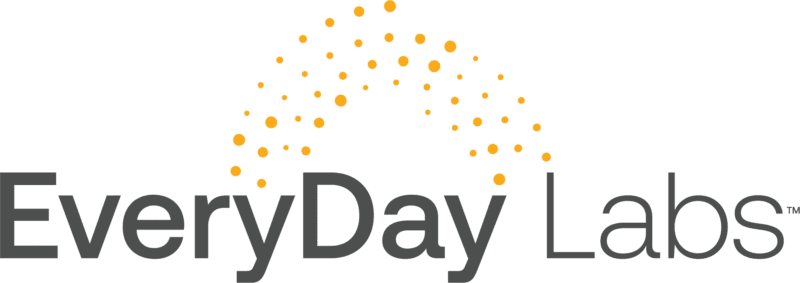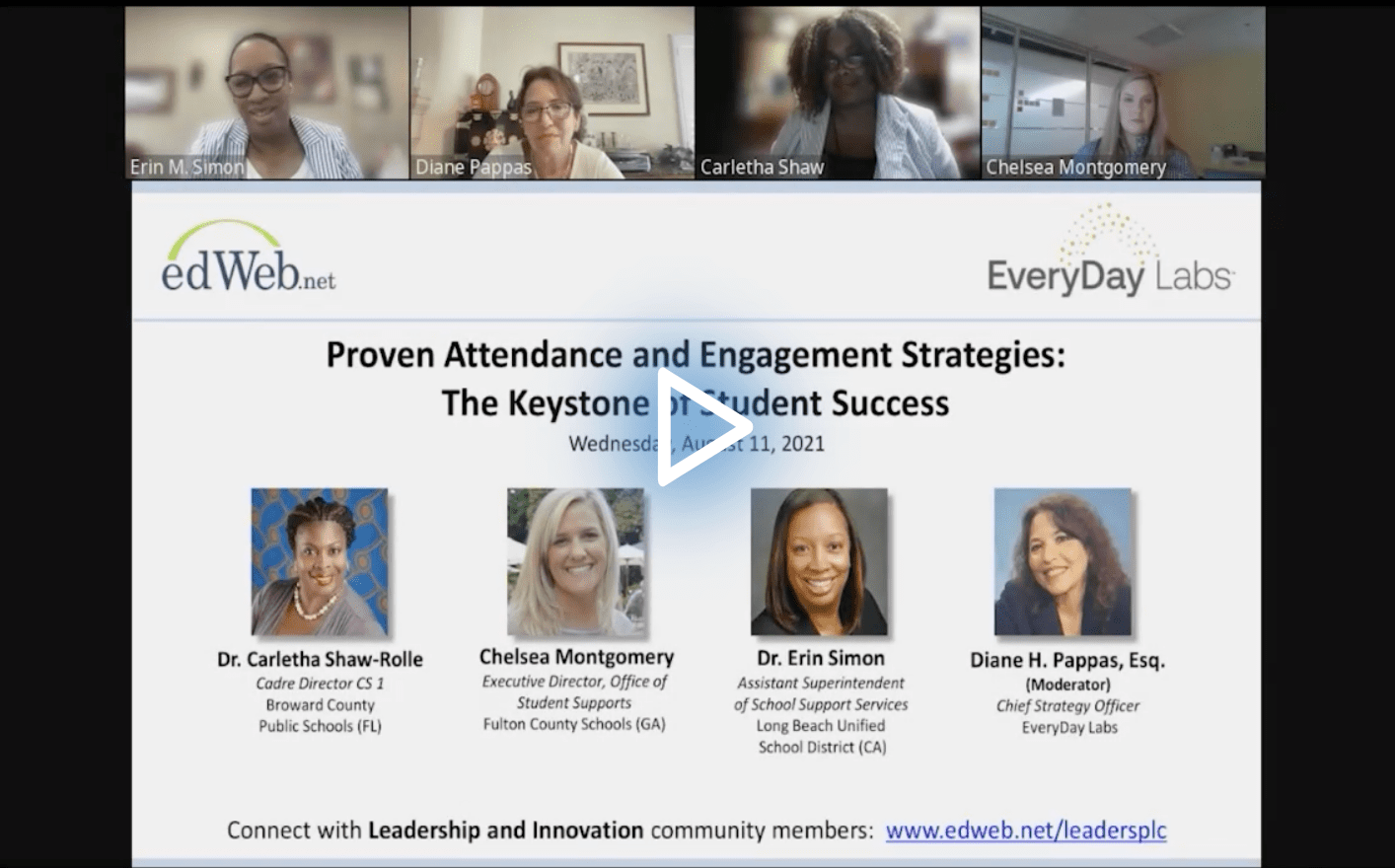Welcoming Students and Families In School to Prevent Absenteeism
Blog post by Stacey Pusey based on this edLeader Panel
Students can’t learn if they’re not in school, but too often, administrators only pay attention when a student is chronically absent. And as schools reopen after a year away, it’s even more important that learners and their families feel wanted at school. During an edLeader Panel sponsored by EveryDay Labs, the presenters shared why family communication is an important part of school attendance and how they make students and families feel welcome in the classroom.
Know what’s happening with your families.
Throughout the school year—and even during the summer—administrators and educators should make sure they are reaching out to every family in the school. These conversations should be focused on the family and not on anything punitive about attendance. The goal is to find out more about the family situation, including challenges, and how the school can help.
Reach out in multiple ways.
Some families appreciate a quick text or email from the principal or superintendent. Others want to have more in-depth conversations. The key is that there is not one single way to reach families—school personnel must be willing to offer their message in a variety of formats. This can even include making home visits. Schools should also have staff members fluent in each of the languages the families use so the families don’t miss anything in translation.
Understand that families’ lives have irrevocably changed.
There is no going back to the schools of 2019, and the families can’t go back to the way they were either. Some students who previously had good attendance may now face significant challenges from losing family members to losing income to losing a home. And almost all students’ mental health is being impacted by the pandemic. If teachers want students to attend and engage in their classes, they need to be ready to listen to and have patience with their students.
Meet students and families where they are.
This goes beyond a one-time meet-up at their house. Educators need to continue the conversations during the year and administrators should provide opportunities that allow the children to continue their education. For instance, many high school students started working during the virtual school year and their families now rely on that income. Schools need to have a plan that doesn’t force students to choose between their family and their education.
Start counting absent students from day one.
Don’t wait until three weeks into the school year—administrators need to be proactive, not reactive, about attendance. Otherwise, students may feel like they’ve missed too much school, and it becomes easier to stay away.
Have tiered strategies for absenteeism.
Some students may have been chronically absent pre-pandemic, and others might just be starting down that path. Have strategies for every level and the resources available to implement them.
Be restorative, not punitive.
If the goal is to get the students back in the classroom, then they need to feel wanted. Create an environment that allows students to struggle, to not be okay, without punishing them.
This edWeb broadcast was sponsored by EveryDay Labs.
Watch the Recording Listen to the Podcast
About the Presenters
Dr. Carletha Shaw-Rolle is the Cadre Director CS 1 in the Broward County Public Schools (FL). She is a 28-year educator who works with principals and school staff to help enrich organizational culture to improve school performance. She is a Barbara L. Jackson Scholar and has presented her work on the relationship among leader influence actions, organizational culture, and performance outcomes at the University Council of Educational Administration (UCEA) and the American Educational Research Administration (AERA). She served as President of the Broward County Chapter of the National Alliance of Black School Educators for more than a decade, fighting for equitable treatment, resources, and opportunities for students of African descent. In 2015, Legacy Magazine named her one of 40 Most Influential Women in Florida. Most recently, Dr. Shaw-Rolle served on the crisis response team for Marjory Stoneman Douglas High School in Parkland, Florida where several people lost their lives to a school shooter. Dr. Shaw-Rolle holds a bachelor’s degree in mathematics and a master’s degree in education from the University of Florida. She recently earned a Ph.D. in educational leadership from Florida Atlantic University.
Chelsea Montgomery is the current executive director of the Office of Student Supports in Fulton County Schools. She leads the work in the areas of MTSS, dropout prevention, social and emotional learning, homeless and foster student supports, disproportionality, crisis and care team, employee incidents, and supports related to school psychologists, school social workers, and school counselors. Chelsea holds a Bachelor of Science in elementary education from East Carolina University, a graduate certificate in Applied Behavior Analysis from Penn State University, and an Educational Specialist degree in school psychology from the University of Tennessee-Chattanooga. Prior to this position, Chelsea has worked in multiple states and in various roles such as a classroom teacher, interventionist, school psychologist, and district office administrator. Chelsea has also been an adjunct professor for five years at the University of South Carolina-Aiken and is a current doctoral student in educational leadership at Georgia State University. Her research interests include Multi-Tiered Systems of Support, evidence-based education, and implementation science.
Dr. Erin M. Simon leads major reform efforts in school districts. In her current role as the assistant superintendent of school support services for the Long Beach Unified School District (LBUSD), Dr. Simon oversees more than 300 staff members and manages a $65,000,000 budget. Dr. Simon leads the direction of the special education and student support divisions, and the Family Resource Centers, which provide social, emotional and behavioral health-related support to students within a cluster of schools in LBUSD. She also provides guidance to the district’s 85 schools, with over 69,000 students, on specialized services that cover compliance and policy, to name a few. Dr. Simon has been recognized and praised for increasing student achievement and school attendance, closing the opportunity gaps between identifiable and pronounced groups of students, and advocating for equitable, robust educational programs, social-emotional interventions and resources to ensure students can reach their potential. She has received numerous awards for her contributions to policy and practice.
About the Moderator
Diane H. Pappas is a nationally recognized executive leader known for implementing cohesive and high-performing strategies for large-scale, complex organizations. She has led several high-profile investigations and successfully managed complex litigations. She recently led a team of more than 300 people in turning around one of the most significant student data projects in the country, My Integrated Student Information System (MiSiS), at the nation’s second-largest school district, Los Angeles Unified School District (LAUSD). Following the success of that initiative, she was appointed Senior Advisor to the Superintendent of LAUSD where she was instrumental in leading the districtwide attendance initiative. A long-time champion for children’s rights, she is passionate about the education and safety of all children. She is also a prolific writer and has published 18 children’s books.
Join the Community
Leadership and Innovation is a free professional learning community on edWeb.net that serves as an online forum for collaboration on leadership and innovation in schools to meet the needs of the next generation.

Stacey Pusey is an education communications consultant and writer. She assists education organizations with content strategy and teaches writing at the college level. Stacey has worked in the preK-12 education world for 20 years, spending time on school management and working for education associations including the AAP PreK-12 Learning Group. Stacey is working with edWeb.net as a marketing communications advisor and writer.




Comments are closed.